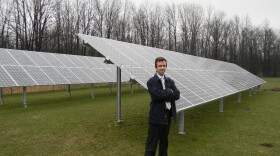Chevron is picking up more than 200,000 acres in Pennsylvania, reports Matt Daily at Reuters, for natural gas drilling in the Marcellus Shale. No word on how much that cost, but Daily reports that other deals in the area have gone for $14,000 an acre.
On the other side of that equation, 300 landowners who had previously leased land to drilling firms are suing to prevent drilling from continuing on their land. Steve Reilly reports at Gannett that Chesapeake Energy's claim of "force majeure" - unexpected events that allow contracts to be extended beyond their original length - is being challenged in court:
The leases, many of which were signed for $3 an acre up to 10 years ago, were signed by smaller companies and sold to Chesapeake, which in 2008 sold 32 percent of its Southern Tier leasehold to Norway-based Statoilhydro. "Chesapeake, 10 years ago, never dreamed that they would be drilling horizontally in the Marcellus Shale," [lawyer Scott Kurkoski] said. "So it's just not fair for them to say, 'Well, we're held up drilling in the shale now' when that's not what they intended to do when they started." The lawsuit claims Chesapeake "engaged in misleading and deceptive practices directed at hundreds, if not thousands, of persons owning real property in New York state" by sending letters to landowners notifying them that their leases have been extended.
Pennsylvania drillers will have to stop dumping used fracking water at 15 wastewater plants by May 19, reports the Associated Press. The crackdown is meant to prevent the water, which contains undisclosed chemicals, from making its way into the drinking supply:
In other major gas-drilling states, drilling wastewater is kept out of rivers largely by injecting it deep underground into disposal wells. But in Pennsylvania, some drilling wastewater is treated by sewer authorities, largely in western Pennsylvania, and discharged into rivers. Those wastewater plants, however, are ill-equipped to remove all the pollutants, and Pennsylvania still allows hundreds of millions of gallons of the partially treated wastewater to be discharged into rivers from which communities draw drinking water. The state Department of Environmental Protection cited elevated levels of bromide in rivers in western Pennsylvania in its announcement.
Gas prices
Oscillating gas prices are bedeviling the consumer price index - and causing volatility in inflation. That's according to the Federal Reserve Bank of St. Louis. Michael S. Derby reports at the Wall Street Journal's Real Time Economics that even though gas prices make up a small part of the "basket" of goods that are used to measure inflation, their constant changes over the past few years have allowed them to have a disproportionate effect:
Many economists, as well as a number of Fed officials, reckon rising fuel prices are largely a force that subtracts from growth. In this view, households’ inability to escape higher fuel costs cuts into spending on other goods and services, which blunts overall growth. Where one comes out on this debate is important. Policymakers who see energy price jumps as inflationary would be more inclined to argue for tighter monetary policy, all things being equal. Those who see energy prices cutting into growth would have to look through the rise in overall inflation and entertain an easier monetary policy regime, to offset to the increased headwinds to growth.
Want more energy news from the Innovation Trail? Subscribe to the feed.






